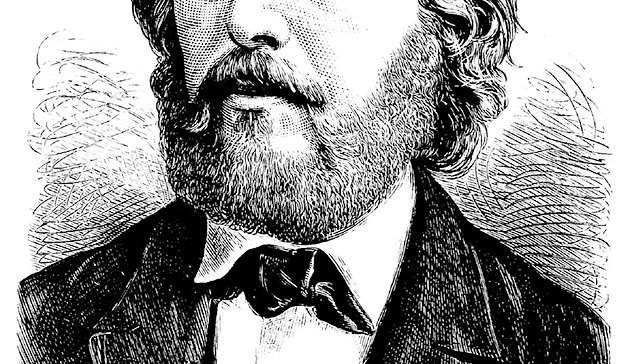Paul Rottenburg an Ernst Haeckel, Glasgow, 13. November 1882
Glasgow 13/11. 82.
Liebster Freund
für Deinen herzlichen Brief vom 20sten October innigsten Dank! Ich komme heute betteln. Schicke mir, bitte, noch ein Exemplar Deiner Eisenacher Rede in der Jenaer Ausgabe. Ich habe das erste Exemplar an einen Freund verschenkt und kann mich nicht enthalten Dir seinen Brief darüber mitzutheilen. Er schreibt mir:
It is a long time since I read anything with as much interest, satsifaction, delight as this lecture of Haeckels || wich I have just finished. What was starlight od moonlight in Goethe and Lamark is now daylight in Darwin and Haeckel, so that we may say with regard to the true order oft he world: physical, moral, religious ‒ „to that runs may read“ or rather the only way not to read ist to run away. I am excessively obliged to you for the pleasure you have given me an for the opportunity (the paper being my own) of imparting the same pleasure to friends like Principal Caird who will highly appreciate it. I wish || it were possible for me to tell Haeckel that here in Scotland whatever may be the case in Germany not a few of the clergy of the orthodox churches are exactly of his way thinking not merely in regard to Science (wich is a matter of course) but in regard to religion and culture. Some of us have scarcely courage enough to avow it in the pulpit but many of us would be much obliged if Providence and Haeckel were to hasten the time when subscriptime to it should be a test of || othodoxy and common sense. ‒
What a contrast to the sermon of thea evangelical preacher such a discourse as this of Haeckel: I dont mean merely in regard to scientific and literary insight and execution but in respect to love and feeling, truth sincerity, manliness, magnanimity, enthusiasm of humanity.
Ich hab es öfter rühmen hören
Ein Komödiant könnt’ einen Pfarrer lehren
How much more on the score of genuine faith and || of the effect as regards culture and religion, mans higher life, the coming in fact throughout the world and for all time of what we call the Kingdom of God, speaks of the effect of new and now generally accepted views of the order of nature. ‒
I wich I had time to quote a part of that lecture wich no one I think could read without admiration or without profit. But you may take my word for it that the stream of it with regard to the dis|coveries oft he order of nature wich have been made in our time is not indeed in so many words but exactly in substance this: „Prepare life in the wilderness“ etc. ‒ ‒ ‒ I do believe for my part that thus Cobden and Haeckel are prophets of a new era, one nearer at hand than any of us perhaps think, more wonderful and more glorious as regards civilization, culture, religion, the Kingdom of God than any, I will not || piety ein Naturforscher like Haeckel.
He may console himself for being a trifle banned by the churchs for the present by reflecting that he is sure to be canonized by them in ages to come ‒ as the church of England already would like to canonize Darwin. That letter of Darwin’s in reply to Haeckels young friends inquiries will live a long time in history and long with it the story of the newspapers concurring an cooperating to supress it. This kein || Licht of Darwin is I think as memorable as Goethes mehr Licht.
Und dieser selbe Freund sagte vor 8 Tagen von einer Kanzel einer Established church über den Text:
„Prepare life in the wilderness the way oft he Lord make straight in the desert a highway of our God.“
It is almost in language borrowed from the prophet Jesaiah it is b certainly in a spirit kindred to his that a distiguished German savant speaks in a recent lecture on the theory of development || say that has been seen anywhere in the world, but than the most enthusiastic spirits of our race have imagined would ever be seen anywhere. ‒
Just such a revolution as steam an electricity have effected in the conditions of human life in regard to material comforts is I think with Haeckel likely to be accomplished in regard to all that is intellectual moral religious by modern discoveries of the order of || nature. ‒
Wie ich mich über diese Auslassungen gefreut habe kann ich Dir garnicht sagen. –
Für heute hast Du genug zu lesen. Darum ein herzliches Lebewohl und viele Grüße an Weib und Kinder von
Deinem
Paul Rottenburg
a eingef.: the; b gestr.: exactly


